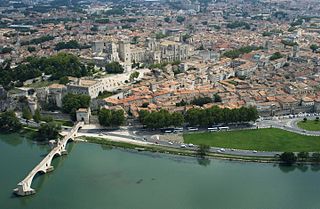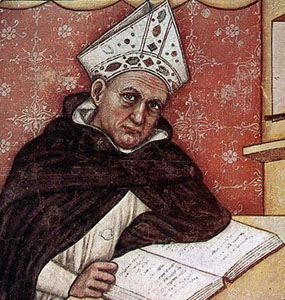
Albertus Magnus,, also known as Saint Albert the Great and Albert of Cologne, was a German Catholic Dominican friar and bishop. Later canonised as a Catholic saint, he was known during his lifetime as Doctor universalis and Doctor expertus and, late in his life, the sobriquet Magnus was appended to his name. Scholars such as James A. Weisheipl and Joachim R. Söder have referred to him as the greatest German philosopher and theologian of the Middle Ages. The Catholic Church distinguishes him as one of the 36 Doctors of the Church.

Pope Innocent VI, born Étienne Aubert, was head of the Catholic Church and ruler of the Papal States from 18 December 1352 to his death in 1362. He was the fifth Avignon pope and the only one with the pontifical name of "Innocent".
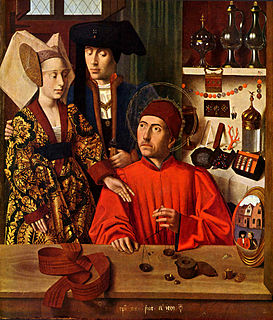
Year 660 (DCLX) was a leap year starting on Wednesday of the Julian calendar. The denomination 660 for this year has been used since the early medieval period, when the Anno Domini calendar era became the prevalent method in Europe for naming years.

Saint Eligius is the patron saint of goldsmiths, other metalworkers, and coin collectors. He is also the patron saint of veterinarians, the Royal Electrical and Mechanical Engineers (REME), a corps of the British Army, but he is best known for being the patron saint of horses and those who work with them. Eligius was chief counsellor to Dagobert I, Merovingian king of France. Appointed the bishop of Noyon-Tournai three years after the king's death in 642, Eligius worked for twenty years to convert the pagan population of Flanders to Christianity.

The Archbishop of Uppsala has been the primate in Sweden in an unbroken succession since 1164, first during the Catholic era, and from the 1530s and onward under the Lutheran church.

Lérins Abbey is a Cistercian monastery on the island of Saint-Honorat, one of the Lérins Islands, on the French Riviera, with an active monastic community.
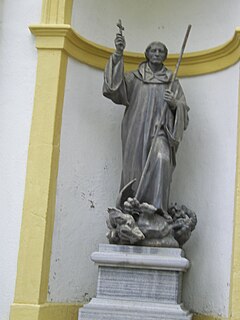
Saint Magnus of Füssen, otherwise Magnoald or Mang, was a missionary saint in southern Germany, also known as the Apostle of the Allgäu. He is believed to have been a contemporary either of Saint Gall or of Saint Boniface and is venerated as the founder of St. Mang's Abbey, Füssen.

Saint Agricola of Avignon was a bishop of Avignon. According to tradition, Agricola ("farmer") was the son of Saint Magnus, also a bishop of the city.
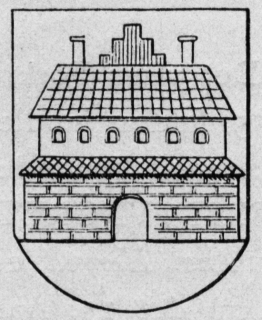
The ancient bishopric of Børglum, sometimes also known as the bishopric of Vendsyssel, seated latterly at Børglum in Denmark, comprised the ancient districts of Vendsyssel and Thy, which between them included the whole of the north of the Jutland peninsula beyond the Limfjord.
Saint Thorlak Thorhallsson, also spelled Thorlac, is the patron saint of Iceland. He was bishop of Skalholt from 1178 until his death. Thorlac's relics were translated to the cathedral of Skálholt in 1198, not long after his successor as bishop, Páll Jónsson, announced at the Althing that vows could be made to Thorlac. His status as a saint did not receive official recognition from the Catholic Church until January 14, 1984, when John Paul II canonized him and declared him the patron saint of Iceland. His feast day is December 23.

Blessed Pierre de Luxembourg was a French Roman Catholic prelate who served the Bishop of Metz and pseudocardinal from 1384 until his death. Pierre was descended from nobles who secured his entrance into the priesthood when he started to serve in several places as a canon before he was named as the Bishop of Metz and a pseudocardinal under an antipope. He was noted for his austerities and successes in diocesan reform as well as for his dedication to the faithful but he tried to end the Western Schism that pitted pope against antipope and rulers against rulers. His efforts were in vain and he was soon driven from Metz but moved to southern France where he died from anorexia as a result of his harsh self-imposed penances.

Anglic de Grimoard, CRSA, was a French canon regular and a Cardinal. He was the younger brother of Pope Urban V.

Saint Chiaffredo is venerated as the patron saint of Saluzzo, Italy. Tradition considers him a member of the Theban Legion, but instead of being martyred with this legion at Agaunum, he escaped to Piedmont and was martyred there.
Saint Magnus of Anagni, also known as Magnus of Trani or Magnus of Fabrateria Vetus, is venerated as the patron saint of Anagni.
Saint Veredemus was an 8th-century hermit who become bishop of Avignon around 700 AD. According to tradition, he was of Greek origin and was born around 640 AD.
Saint Siffredus of Carpentras was a bishop of Carpentras who is venerated as a saint by the Catholic Church.

Blessed Augustin Kažotić was a Dalmatian-Croatian Roman Catholic prelate and professed member from the Order of Preachers who served as the Bishop of Lucera from 1322 until his death. Kažotić was a humanist and orator who had served first as the Bishop of Zagreb from 1303 until 1322. Kažotić studied in Paris before returning to his homeland where he began working in the missions and preaching in modern Bosnia. He was one of the first humanist figures to appear in southern Croatia.
Thomas Fastolf, sometimes spelt Fastolfe, was an English canon lawyer and Bishop of St David's from 1352 until his death.
Saint Florentius of Orange was bishop of the city of Orange in France around 517-524. Recognized as a saint by the Roman Catholic Church, his feast day is on 17 October.


